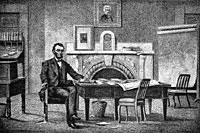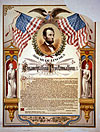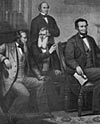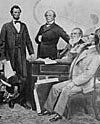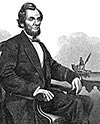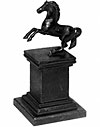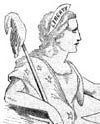Mr. Lincoln’s office was the center of the Lincoln White House — where Cabinet Meetings were held on Tuesday and Friday, where the President met most officials and guests, read and answered his mail, where he his hair was cut and his beard trimmed, and where he paced the floor after military defeats. The office overlooked the unfinished Washington Monument, the Potomac River and encampments of Union soldiers. It was connected to the family library by a small, private passageway built during the Lincoln Administration. The hall was built through the Reception Room and provided private access to the President’s living quarters, free from the prying eyes of those seeking a job or a pardon.
The furniture included an armchair located between the windows, an old mahogany writing desk with pigeonholes near the window wall, another smaller desk against the window wall, a large walnut table in the middle of the room for cabinet meetings on which were often piled maps and books, two horsehair sofas and several wooden chairs. “Folios of maps leaned against the walls or hid behind the sofas. Volumes of military history and kindred literature came and went from various libraries and had their days of lying around the room or on the President’s table,” aid William O. Stoddard later wrote. 1 Over the fireplace on the west wall was an engraved portrait of Andrew Jackson. A photograph of English reformer John Bright hung on the wall. Gas lights furnished lights and a fireplace furnished warmth. The president could summon staff with a bell cord near his desk. A small wash-closet was located on the north wall of the room, which included the door through which most visitors entered. There were gas lighting fixtures but they were not necessarily in the best working order. A gas leak almost overcame the President one morning on September 9, 1864.
The room and its furnishing were as battered as it occupant in the early days of the war. Oilcloth covered the floor but nothing could cover the dilapidated state of the president’s desk or the gloom that sometimes enveloped President Lincoln. Early in his Administration after the bombardment of Fort Sumter had opened hostilities between North and South, the President was observed one night, pacing in his office, looking forlornly out the windows toward the Potomac, and asking out loud about expected Union troops expected to arrive from northern states: “Why don’t they come? Why don’t they come!” 2
What did come over the next four years were people seeking his help and intervention. Often, the requests involved jobs, patronage, promotions, and pardons. After his reelection, one Republican even wrote: “Dear Old Abe: Yesterday I worked hard for you all day, and wore out my boots. Please send a new pair by mail.” 3 Whatever his troubles, the President’s door was almost always open during this period. He greeted people with a simple “What can I do for you?” Charles A. Dana, a prominent Republican journalist, recalled one interview about patronage for New York which was evidently interrupted by an urgent demand from Mary Todd Lincoln:
Mr. Lincoln received us in the large room upstairs in the east wing of the White House, where he had his working office. The President stood up while General [James Wadsworth], who was our principal spokesman, and Mr. Opdyke stated what was desired. After the interview had begun, a big Indianian, who was a messenger in attendance in the White House, came into the room and said to the President:
‘She wants you.’
‘Yes, yes,’ said Mr. Lincoln, without stirring.
Soon afterward messenger returned again, exclaiming, ‘I say, she wants you!’
The President was evidently annoyed, but instead of going out after the messenger he remarked to us:
‘One side shall not gobble up everything. Make out a list of places and men you want, and I will endeavor to apply the rule of give and take.’ 4
All military appointments had to be approved and signed by the president. There were many pressures on the president – some personal, some political and always military to reward individuals with a military post commensurate with their egos and ability. One War Department official who worked on those appointments later recalled going through some applications that the President had sent over. Among the notes that President Lincoln had written was one which indicated that the annoying persistence of some callers: “On this day Mrs. ____ called upon me. She is the wife of Major ____ of the regular army. She wants her husband made a brigadier-general. She is a saucy little woman, and I think she will torment me till I have to do it. – A.L.” The husband got the job. 5
Among those pressures were Republicans who thought that the high ranks of the army were filled with too many West Point-trained Democrats. George B. McClellan and his subordinates fell into this category in 1861 and 1862. One of the President’s continuing concerns was the appointment of high-ranking officers of “Dutch” descent, in order to placate German voters who had been a key factor in his election. Provost Marshal James B. Fry related how such factors entered into a conversation between the President and Secretary of War Edwin Stanton:
“Well, Mr. Secretary, I concur in pretty much all you say. The only point I make is, that there has got to be something done that will be unquestionably in the interest of the Dutch, and to that end I want Schemmelfinnig appointed.”
The Secretary replied: “Mr. President, perhaps this Schemmel-what’s-his-name is not as highly recommended as some other German officer.”
“No matter about that,” said Lincoln, “his name will make up for any difference there may be, and I’ll take the risk of his coming out all right.’
Then, with a laugh, he repeated, dwelling upon each syllable of the name, and accenting the last one, “Schem-mel-fin-nig must be appointed.’ 6
Poet-historian Carl Sandburg how a lesser ranking appointment was handled: “T. B. Bancroft stood for an hour within three feet of Lincoln’s desk, waiting to ask for a pass through Army of Potomac lines to visit the son of a friend in the 3d Pennsylvania Cavalry. Bancroft had waited half an hour with about 50 others in the Blue Room below stairs until the announcement from a colored attendant that the President was ready to receive them, when the crowd rushed pell-mell upstairs into the office. Wrote Bancroft: “Mr. Lincoln sat at the back end of the enclosure…a pair of short-shanked gold spectacles sat low down upon his nose, and he could easily look over them.’ A boy in army blue took the chair, handing his papers to the President, who read them and said, ‘And you want to be a captain?’ ‘Yes, sir.’ ‘And what do you want to be captain of? Have you got a company?’ ‘No, sir, but my officers told me that I could get a captain’s commission if I were to present my case to you.’ ‘My boy – excuse my calling you a boy – how old are you?’ ‘Sixteen.’ ‘Yes, you are a boy, and from what your officers say of you, a worthy boy and a good soldier, but commissions as captains are generally given by the governors of the States.’ ‘My officers said you could give me a commission.’ ‘And so I could, but to be a captain you should have a company or something to be captain of. You know a man is not a husband until he gets a wife–neither is a woman a wife until she gets a husband. I might give you a commission as captain and send you back to the Army of the Potomac, where you would have nothing to be captain of, and you would be like a loose horse down there with nothing to do and no one having any use for you.’
“The boy began breaking, tears in his eyes. The President put a hand on the boy’s shoulder, patting while he spoke: ‘My son, go back to the army, continue to do your duty as you find it to do, and with the zeal you have hitherto shown, you will not have to ask for promotion, it will seek you. I may say that had we more like you in the army, my hopes of the successful outcome of this war would be far stronger than they are at present. Shake hands with me, and go back the little man and brave soldier that you came.’ The boy stepped away as if he had been home to see a wise and kindly father.” 7
Not all visitors wanted something. Some were simply curious or desirous of paying their respects. Black abolitionist Sojourner Truth, for example, came to Washington on October 29, 1864 to express her appreciation for Mr. Lincoln’s emancipation efforts: “I thank God that you were the instrument selected by Him and the people to do it,” she told him. 8 She later recalled:
It was about eight o’clock, A.M., when I called on the President. Upon entering his reception-room we found about a dozen persons in waiting, among them two colored women. I had quite a pleasant time waiting until he was disengaged, and enjoyed his conversation with others; he showed as much kindness and consideration to the colored persons as to the whites, – if there was any difference, more. One case was that of a colored woman, who was sick and likely to be turned out of her house on account of her inability to pay her rent. The President listened to her with much attention, and spoke to her with kindness and tenderness. He said he had given so much he could give no more, but told her where to go and get the money, and asked Mrs. C., who accompanied me, to assist her, which she did.
The President was seated at his desk. Mrs. C. said to him: ‘This is Sojuourner Truth, who has come all the way from Michigan to see you.’ He then arose, gave me his hand, made a bow, and said: ‘I am pleased to see you.’
I said to him: ‘Mr. President, when you first took your seat I feared you would be torn to pieces, for I likened you unto Daniel, who was thrown into the lions’ den; and if the lions did not tear you into pieces, I know that it would be God that had served you; and I said if He spared me I would see you before the four years expired, and He has done so, and now I am here to see you for myself.’
He then congratulated me on my having been spared. Then I said: ‘I appreciate you, for you are the best President who has ever taken the seat.’ He replied thus: ‘I expect you have reference to my having emancipated the slaves in my proclamation, but,’ said he, mentioned the names of several of his predecessors (and among them emphatically that of Washington), ‘they were all just as good, and would have done just as I have done if the time had come. If the people over the river (pointing across the Potomac) had behaved themselves, I could not have done what I have; but they did not, and I was compelled to do these things.’ I then said: ‘I thank God that you were the instrument selected by Him and the people to do it.’
He then showed me the Bible presented to him by the colored people of Baltimore….After I had looked it over, I said to him: ‘This is beautiful indeed; the colored people have given this to the Head of the Government, and that Government once sanctioned laws that would not permit its people to learn enough to enable them to read this Book. And for what? Let them answer who can.’
I must say, and I am proud to say, that I never was treated by any one with more kindness and cordiality than was shown me by the great and good man, Abraham Lincoln, by the grace of God President of the United States for four years more. He took my little book, and with the same hand that signed the death-warrant of slavery, he wrote as follows: –
‘For Aunty Sojourner Truth,
‘Oct. 29, 1864.
A. Lincoln.’
As I was taking my leave, he arose and took my hand, and said he would be pleased to have me call again. I felt that I was in the presence of a friend, and I now thank God from the bottom of my heart that I always advocated his cause, and have done it openly and boldly. I shall feel still more in duty bound to do so in time to come. May God assist me. 9
New York Secretary of State Chauncey M. Depew recalled: “I had a long and memorable interview with the president. As I stepped from the crowd in his reception-room, he said to me: ‘What do you want?’ I answered: ‘Nothing, Mr. President, I only came to pay my respects and bid you good-by, as I am leaving Washington.’ ‘It is such a luxury,’he then remarked, ‘to find a man who does not want anything. I wish you would wait until I get rid of this crowd.’ When we were alone he threw himself wearily on a lounge and was evidently greatly exhausted. Then he indulged. rocking backward and forward, in a reminiscent review of different crises in his administration, and how he had met them. In nearly every instance he had carried his point, and either captured or beaten his adversaries by a story so apt, so on all fours, and such complete answers that the controversy was over. I remember eleven of these stories, each of which was a victory.” 10
Soon after arriving for army service in Washington in Washington in April 1861, a young Harvard graduate, Robert Gould Shaw, paid a visit on President Lincoln. Later, as regimental colonel of the 54th Massachusetts, Shaw gained fame in leading his black troops in an unsuccessful assault on Fort Wagner in South Carolina in 1864: “After waiting a few minutes in an antechamber, we were shown into a room where Mr. Lincoln was sitting at a desk, perfectly covered with papers of every description. He got up and shook hands with us in the most cordial way, asked us to be seated, and seemed quite glad to have us come. It is really too bad to call him one of the ugliest men in the country, for I have seldom seen a pleasanter or more kind-hearted looking one, and he has certainly a very striking face. His voice is very pleasant; and though, to be sure, we were there only a few minutes, I didn’t hear anything like Western slang or twang in him. He gives you the impression, too, of being a gentleman. I told him I had heard of his son at Cambridge; and we talked a little about our regiment. 11
The growing strain of the war was evident in a description by Dr. T. Dewitt Talmage of a meeting in the President’s office: “We followed into his room a committee who had come to Washington to tell the President how to conduct the war. We do not know who the committee was. The president was the saddest looking man I ever saw. He had a far-away look . He evidently, while standing under the fire of an address which was being made to him, saw the battlefields and hospitals and conflagrations and national bereavement. One of his great trials was that of being subjected to advice by people of all sorts who had no qualification for giving advice. When one of our party asked for his autograph, he cheerfully gave it, asking, ‘Is this all I can do for you?’ 12
Not every visitor exercised such restraint. Many thought they knew better than the President how to run the country and conduct the war. John G. Nicolay recorded that once when he went into the President’s office one morning, “I found a little party of Quakers holding a prayer-meeting around him, and he was compelled to bear the affliction until the ‘spirit’ moved them to stop. Isn’t it strange that so many and such intelligent people often have so little common sense?” 13
Although the President was normally patient with such requests and interruptions, his patience could dissolve. One military petitioner persisted in retelling his complaint over and over while President Lincoln looked passively out the office window. Finally, the President cut him off: “Now, my man, go away, go away! I cannot meddle in your case. I could as easily bail out the Potomac River with a teaspoon as attend to all the details of the army.” 14 On another occasion, an Ohio congressman arrived in the office just as the President was reciting a line of his favorite poem: “Oh, why should the spirit of mortal be proud? According to humorist David R. Locke, the congressman was “in a state of unutterable intoxication, and sinking into a chair, exclaimed in tones that welled up fuzzy through the gallon or more of whisky that he contained, ‘Oh, why should (hic) er spirit of mortal be proud?'” The President observed the congressman carefully and responded: “My dear sir, I see no reason whatever.” 15
The President was never too tired to receive good news. General Benjamin Butler reported one nocturnal visit to the White House in 1861:
Dropping a twenty-dollar gold piece in the hands of the engineer, I got off, woke a sleeping negro in a carriage, and told him to drive up to Postmaster-General Blair’s house, opposite the White House, as fast as he could. As I drove up I saw Mr. [Montgomery Blair] and the Assistant Secretary of the Navy, Mr. [Gustavus Fox], sitting together in his study. I went in. Fox knew that I had gone on the expedition to Hatteras, for it was one in which he was much interested. When he saw me he cried out: “Where from?”
“Direct from Hatteras.”
“What news?”
I stated the result of the expedition. He was very much elated, and asked me to go right over and tell the President about it.
“We ought not to do that,” said I, “and get him up at this time of night. Let him sleep.”
“He will sleep enough better for it; so let us go and wake him up.”
We went over to the White House and got the watchman up. It took us some fifteen minutes to do it, and I remember remarking to Fox that if I was on the other side I could have come here and captured the President and carried him off. Then we went up into the Cabinet room. The President was called, and when our errand was hinted to him he immediately came in in his night shirt.
Everybody knows how tall Lincoln was, and he seemed very much taller in that garment; and Fox was about five feet nothing. In a few hurried words, without waiting for any forms or ceremonies, Fox communicated the news, and then he and Lincoln fell into each other’s arms. That is, Fox put his arms around Lincoln about as high as his hips, and Lincoln reached down over him so that his arms were pretty near the floor apparently, and thus holding each other they flew around the room once or twice, and the night shirt was considerably agitated. The commanding general was entirely overcome by the scene, and lying back on the sofa roared with the most irresistible merriment.
It was the first considerable success that the navy had anything to do with up to that time, or, indeed, the army either, except at Baltimore and Annapolis. The President shook me very warmly by the hand, and when I ventured to speak about what I had not done, he said: “you have done all right, you have done all right. Come to-morrow at ten o’clock and we will have a Cabinet meeting over it.”
I retired, and at ten o’clock the next morning I made my report to the President in Cabinet meeting. Among those present was General [George McClellan], whom I then saw for the first time. I explained the whole situation, giving reasons why I had not obeyed orders and stopped up the Hatteras Inlet, and also stating the necessity for holding Fort Hatteras. On the next day I had the pleasure to report to my chief, General Wool, whom I never saw as such afterwards, that the Cabinet had voted unanimously that he should hold Fort Hatteras and Hatteras Inlet.
I had opened the way through Annapolis for the troops to save the capital; I had fulfilled my mission at Fortress Monroe; and by taking Hatteras I had atoned for capturing Baltimore and wiped out Big Bethel, all in a campaign of four months and fifteen days, besides showing the administration and the country the best way out of the slavery question. In all this time nobody else had done anything except to get soundly thrashed at Bull Run. Therefore I asked the President, as I had not been home since I left there on the 16th of April, if he would be kind enough to relieve me and allow me to go home. His farewell when he shook my hand was characteristic:—
“You have a right to go home, General, for a little rest, but study out another job for yourself.” 16
By 1863, the President more closely screened his callers. According to Dr. Anson G. Henry, the President’s longtime friend, “nine times out of ten not half the Senators get in unless several go in together & this is very often done, and they can take in with them as many of their friends and constituents as they please. It is no uncommon thing for Senators to try for ten days before they get a private interview.” 17
Frederick Seward, who was the chief deputy to his father, Secretary of State William H. Seward, wrote in his memoirs, Reminiscences of a War-time Statesman and Diplomat about the first month of the new administration in 1861: “President Lincoln now had set about his laborious duties in good faith, and the first shape in which they presented themselves to him was in the swarm of office-seekers that beleaguered the White House, filling all the halls, corridors, and offices from morning till night. The patient good humour and the democratic habits of the new President led him to give audience to everybody, at all hours. Even the members of his Cabinet, sometimes had to force their way through the crowd and get the private ear of the President in the corner of a roomful of visitors, before they could impart to him grave matters of state. My father was a daily and frequent visitor at the White House during this month of crowds and confusion. I found myself often a bearer of messages from one to the other, about matters too important for longer delay. At first, when I would take up to the President a paper for his signature, he would spread it out and carefully read the whole of it. But this usage was speedily abandoned, and he would hastily say, ‘You father says this is all right, does he. Well, I guess he knows. Where do I put my name?” 18
The President himself did not pretend to read much of the paperwork he signed, telling Francis Carpenter that “I see that Stanton has signed them so I conclude they are alright.” Completing such work one night, he told Carpenter, “Well, I have that job husked out; now I guess I’ll go over to the War Department before I go to bed and see if there is any news.” 19
Much of the President’s work — when not directly supervising the war effort, involved either meeting people or dealing with paperwork. Sometimes, the two functions were inseparable — jobs seekers led to job appointments. According to the Helen Nicolay, the daughter of Lincoln’s principal secretary: “Since the President’s signature had to be on every new appointment or advance in military rank, this necessitated an endless amount of writing on Mr. Lincoln’s part. My father has said that the President would sit down at his desk day after day before a pile of such documents six or eight inches high and go at the monotonous task ‘with the patient industry of a laborer sawing wood.’ It truly was heavy labor, for all the commissions were made out on heavy parchment which was very oily and hard to write upon.’ 20
There was one domestic touch in a room otherwise totally devoted to work; Mr. Lincoln’s son Tad frequently fell asleep here while his father worked here.
Footnotes
- William O. Stoddard: Abraham Lincoln: The Man and The War President, p. 245.
- Rufus Wilson, editor, Intimate Memories of Lincoln, p. 608.
- Charles A. Dana, Recollections of the Civil War, p. 3-4.
- James B. Fry, Allen Thorndike Rice, editor, Reminiscences of Lincoln, p. 391.
- Fry, in Rice, Reminiscences of Lincoln, p. 391-392
- Carl Sandburg, Abraham Lincoln, The Prairie Years and War Years, p. 390. See Rufus Rockwell Wilson, editor, Intimate Memories of Lincoln, p. 490-491.
- Harold Holzer, editor Lincoln as I Knew Him, p. 200.
- Francis B. Carpenter. Six Months at the White House with Abraham Lincoln, p. 201-203.
- Rufus Rockwell Wilson, Intimate Memories of Lincoln, p. 503 (from Chauncey M. Depew, My Memories of Eighty Years)
- Peter Burchard, One Rush, p. 36.
- Gilson Willets, Inside History of the White House, p. 107.
- Benjamin Thomas, Abraham Lincoln, p. 459.
- James B. Fry, Allen Thorndike Rice, editor, Reminiscences of Lincoln, p. 393.
- David R. Locke, Allen Thorndike Rice, editor, Reminiscences of Abraham Lincoln, p. 451-452.
- Benjamin Butler, The Butler Book, Volume I, p. 287-289
- See Benjamin Thomas. Abraham Lincoln, p. 457-58.
- Frederick Seward, Reminiscences of a War-time Statesman and Diplomat, p.147-148.
- Benjamin Thomas, Abraham Lincoln, p. 472.
- Helen Nicolay, Lincoln’s Secretary, p. 113.
Visit
Charles A. Dana
Salmon P. Chase
Gideon Welles
William H. Seward
Edwin M. Stanton
Montgomery Blair
Benjamin Butler
Gustavus V. Fox
Ulysses S. Grant
John Hay
John Nicolay
Anson Henry
Francis Carpenter

